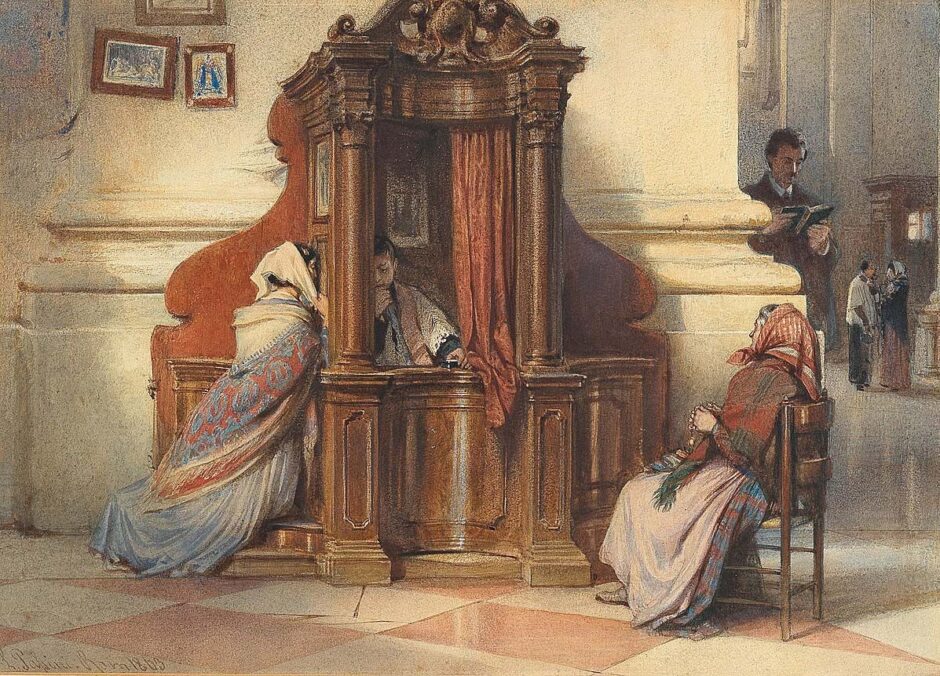![]() It is Tuesday in the Octave of Pentecost
It is Tuesday in the Octave of Pentecost
Here is an oldie PODCAzT I made for this day last year:
057 08-05-13 John Paul II on the unforgivable sin; Our Lady of Fatima and the vision of Hell – TUESDAY
On this day is the traditional "Dancing Procession" in Echternach, Luxembourg, founded by St. Willibrord. As bands play, the people move forward slowly in lines, holding white handkerchiefs. They "dance" with little kicks to the left and right and thus make slow progress.
[youtube=http://www.youtube.com/watch?v=EHx110kDcB4]
The Collect for Holy Mass in the Extraordinary Form is a bit more solemn than the procession.
COLLECT (1962MR):
Adsit nobis, quaesumus, Domine,
virtus Spiritus Sancti:
quae et corda nostra clementer expurget,
et ab omnibus tueatur adversis.
This prayer struck me as having an ancient pedigree. Thus, I opened my copy of the critical edition of the Liber sacramentorum Gellonensis, and scanned the index of incipits. There were very many prayers which begin with the "comic/legal" imperative adesto, from the same verb adsum, but very few with adsit. Sure enough, I found today’s prayer in the days after Pentecost: CXLVIIII FER III. AD SCA ANASTASIAM. Today. The Roman Station today is at St. Anastasia. Thus, this is an ancient Roman oration.
That verb adsum means "to be present". When ordinands are called by name… the technically precise moment of a man’s "vocation" or "calling"… he responds "Adsum … I am present". The form here is in the subjunctive, and it functions as a mild imperative. Along the way it looks as if we have a characteristic result clause, which needs the subjunctive as well. Note the et…et… construction, to say "both…and…". There is a nice stylish division of omnibus… adversis, giving us an elegant rhythm. I also like the assonance in the first two lines with "u".
LITERAL VERSION:
May there be present to us, O Lord, we beseech You,
the power of the Holy Spirit:
with the result that it both mercifully cleanses our hearts,
and protects (them) from every adverse thing.
When we are baptized the Holy Spirit begins to inhabit our hearts, abiding with us, remaining in us in a habitual manner. The Holy Spirit imparts the theological virtues of faith, hope and charity together with the fruits and gifts. The Holy Spirit abiding in us gives us sanctifying grace, the grace we call "habitual" grace. There are also "actual" graces, given for this or that purpose.
By our baptism we are justified before God and also sanctified.
We can lose the state of grace, sanctifying grace.
Usually this happens when our choice to love some created thing moves us to act out of accord with God’s law and in disharmony with the image of God in us and in others. We in effect drive the Holy Spirit from us. Indeed, since all the Persons of the Trinity act together, we push the God, Three and One, from our souls.
Through actual graces God urges us to be reconciled.
The way in which God Himself desires that we be reconciled is by means of the Sacrament of Penance/Reconciliation through the ministry of the Church He instituted. Before His Ascension, Christ breathed is SPIRIT on the Apostles and gave them His own power and authority to forgive sins. This is the way Christ wants us to seek forgiveness: otherwise He would not have given us this sacrament.
In the Collect, we ask God to cleanse from our hearts anything that would be an obstacle to the indwelling of the Persons of the Trinity. Then we beg that the power of the Holy Spirit protect our hearts from anything which might be bad for us. This need not be merely the aggressive attacks of the Enemy of the soul. It might also be our own disordered passions and appetites which, fixing on some created thing, begins to love it or use it in a disordered way, placing that created thing in the place God alone should be entited to possess.
The bottom line: The way to salvation has been opened to us. We can lose that way by our choices. We must never supplant God from His rightful place in our souls by choosing to enthrone there any creature… person, thing or state.
































Well said, Father Z.
May I ask what software you use for your Podcast recording?
I use something called “Music Maker”.
Oh, wow. St. Willebrord’s my patron saint that nobody’s ever heard of, so it’s always cool whenever I hear something to do with him :)